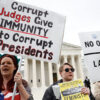The battles over how to pay for President Donald Trump’s proposed border wall are just getting started, but the administration is already calling for proposals from companies who would build it.
The wall is just one part of the White House plan to stop illegal immigrants crossing the southern border. There’s also going to be a hiring spree, with thousands of new Border Patrol agents and immigration officers added to the federal workforce. It’s not the first time this has been tried. I recently heard a cautionary tale from James Tomsheck, former head of internal affairs at Customs and Border Protection.
>>>Find out when and where you can watch “Full Measure”
The following is from my interview with Tomsheck:
Attkisson: What is the potential downside of doing mass hirings all at once?
Tomsheck: I very much hope that those going forward with the initiative look at what we’ve learned when we executed the Border Patrol search of 2006-2008.
Attkisson: How many were hired in that surge?
Tomsheck: More than 10,000 in that period of time. It was done without many of the security protocols that are in place today.
Attkisson narration:
As we reported last year on “Full Measure,” the Border Patrol is a key target for Mexican drug cartels looking to infiltrate the force by getting their own operatives hired and or corrupting agents. The rewards of corruption can be enormous and it’s such a concern, the FBI has about two dozen border corruption task forces dedicated solely to rooting out officers on the take. Officer Michael Gilliland was caught on FBI surveillance video allegedly carrying a cash payoff in a bag. He pleaded guilty to letting in hundreds of illegal immigrants for $120,000 in bribes. Officer Margarita Crispin is serving 10 years for taking bribes to let marijuana through.
Attkisson: Is it accurate to say that drug dealers and drug cartel members were hired as part of the surge inadvertently?
Tomsheck: We certainly believe that to be the case. We do know that in the thousands of polygraph exams that we administered after the background investigation, more than half of those persons that cleared that background investigation failed the polygraph exam and provided detailed admissions as to why it was they failed the exam …
Included in that study group of more than 1,000 were persons who admitted that they were infiltrators, that they actually worked for a drug-trafficking organization, either on the U.S. side of the border or the Mexican side of the border, who had been directed to infiltrate CBP [Customs and Border Protection] and compromise what they do there.
Attkisson narration:
For most of the hiring spree of 2006 to 2008, polygraph exams weren’t required, which alarmed Tomsheck, who previously served in the U.S. Secret Service. He was instrumental in making lie detector tests mandatory for new Border Patrol agents.
Tomsheck: What we found in those first 100-plus exams that we did was genuinely shocking. They had included many persons who were actively involved in smuggling activity. Persons who very frequently used drugs were currently using controlled substances, and included persons involved in significant serious felony crimes.
Attkisson: As a man looking at corruption inside the agency, do you assume in retrospect that the agents were hired despite, perhaps, cartel contacts and other corruption issues?
Tomsheck: Unfortunately, I think it’s a virtual certainty that at least 5 percent of the workforce that was hired during that period of time are likely persons who have engaged in criminal misconduct and likely engaged in acts of corruption. And may have done so before they entered on duty with CBP.
Attkisson: In a sentence or a phrase, your best advice to the Trump administration on this?
Tomsheck: Move very cautiously. If there is a reduction in the security protocols to screen and vet applicants, I believe we will reduce and compromise the agency’s future integrity.



























